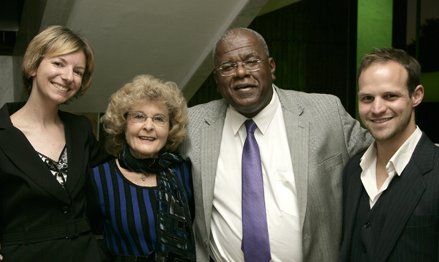Latest News Archive
Please select Category, Year, and then Month to display items
27 December 2019
|
Story Dr Cindé Greyling
|
Photo Supplied

KovsieInnovation at the UFS is bridging the gap between industry and academics with a powerful force. For too long, research remained an academic pursuit, with many innovative ideas stuck between the pages of a thesis – only to come alive during exclusive, short-lived conference proceeds.
KovsieInnovation
Recently, Gerard Verhoef, Director in the Directorate: Research Development (DRD), and his team from KovsieInnovation finalised their Innovation and Commercialisation Strategy in order to create a structured pathway for good ideas. The primary objective of KovsieInnovation – the UFS Innovation and Entrepreneurship Office – is to achieve sustainable growth in third-stream income from innovative research activities stemming from the UFS. “Potential successful ideas must be feasible, viable, and sustainable, and we formulated an eight-step plan to facilitate this,” Verhoef explains. Ultimately, the DRD wants to attract new and continuous research as a renowned academic knowledge partner that can foster, drive, and successfully commercialise innovative research activities; and in doing so, foster an entrepreneurial culture at the UFS.
Liquid Culture
One such success story is the development of Liquid Culture into a business of choice, supplying liquid yeast to breweries and bakeries. Christopher Rothmann and Dr Errol Cason are the driving forces behind this company that produces their sought-after and stable yeast product in the Department of Microbiology, Biochemistry and Food Biotechnology at the UFS. With world-class equipment and laboratories, they house one of the largest yeast-culture collections in the world.
Both Rothman and Dr Cason were home brewers for many years before starting to produce commercial batches. They believe it would not have been possible without the help of KovsieInnovation. This project was also one of the finalists in the National Entrepreneurship Intervarsity.
Christo Strydom Nutrition (CSN)
Another innovative way in which the UFS generates third-stream income via the DRD, is by partnering with already successful commercial products. One such example is the recent successful royalty agreement with CSN. With this transaction, the university unlocked its brand potential to the benefit of both the industry partner and the UFS. Quality assurance remains the key success factor for deals like this.
'England, the English and the problem of education in South Africa.’
2013-09-26
|
 |
Attending the lecture were, from the left: Dr Susan Brokensha, Senior Lecturer: Department of English; Prof Rosemary Gray, Professor Emeritus (Honorary Life Vice-President of the English Academy of Southern Africa); Prof Jonathan Jansen; and Dr Thinus Conradie, Lecturer: Department of English.
Photo: Johan Roux
26 September 2013 |
Prof Jonathan Jansen: Lecture
The university celebrated the life of one of South Africa's most renowned art critics, hosting the 2013 English Academy’s Percy Baneshik Memorial Lecture on the Bloemfontein Campus.
The keynote lecture was delivered by Prof Jonathan Jansen, Vice-Chancellor and Rector, who joined a distinguished list of speakers to have delivered the lecture. Presented annually by the English Academy of Southern Africa, an association dedicated to promoting the effective use of English as a dynamic language in Southern Africa, past speakers include Prof Es’kia Mphahlele, Prof Njabulo Ndebele, Dr Alan Paton and Prof Albie Sachs. The lecture is hosted at venues across the country and this year Bloemfontein paid tribute to Percy Baneshik.
In his speech Not even colonial born: England, the English and the problem of education in South Africa,' Prof Jansen addressed the dilemma of the politics of language in both school and university education today.
Talking about the dominance of English in schools, Prof Jansen said it is the language of choice because indigenous languages are so poorly taught. "Simply learning in your mother tongue is absolutely no guarantee of improved learning gains in school. The problem is not the language of instruction; it is the quality of teaching, the knowledge of curriculum and the stability of the school."
Prof Jansen told the audience in the CR Swart Hall that Afrikaans-exclusive, or even Afrikaans-dominant white schools represent a serious threat to race relations in South Africa. "You simply cannot prepare young people for dealing with the scars of our violent past without creating optimal opportunities in the educational environment for living and learning together."